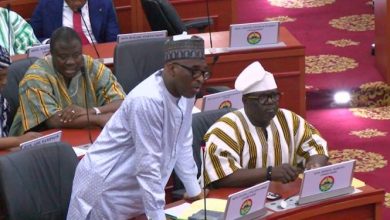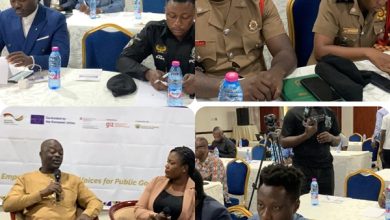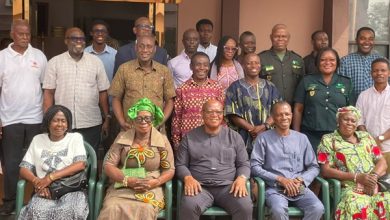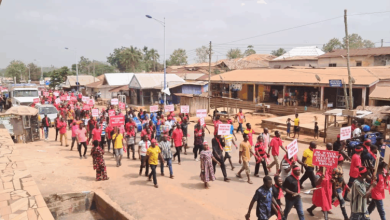Anti-LGBTQI+ Bill yet to be submitted to presidency says Majority Leader
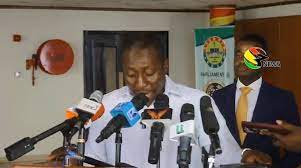
Majority Leader in Parliament Alexander Afenyo-Markin, has stated that the Human Sexual Rights and Family Values Bill, (Anti-LGBTQI+ Bill), has not yet been transmitted from Parliament to the office of the President for assent.
The Effutu lawmaker explained that the drafting department of Parliament is currently finetuning the bill after it was passed by the House on Wednesday, 28 February 2024 due to the several amendments that were made during the consideration stages of the Bill.
Once the final draft is ready, it will be presented to the sponsors for review and subsequently authenticated by the Clerk to Parliament, initiating the necessary procedural steps before the Bill is submitted to the President for his signature, Afenyo-Markin explained.
Addressing the media in Parliament on Monday, 4 March 2024, Afenyo-Markin emphasized that the bill is still undergoing internal parliamentary processes before reaching the President’s desk for approval.
“There’s some seeming pressure on the presidency regarding the anti-LGBTQ+ parliament passed. Well, the process is that when the bill is passed in Parliament, it must first be compiled by the drafting department in Parliament.
“As we speak, as the leader of the house, I can say on authority that we’ve not completed the process. The bill is yet to be sent to the president for signing. So the public needs to know this so that a certain impression is not created out there that Parliament has submitted the bill to the presidency and all. Nothing has moved to the presidency,” the Majority Leader remarked.
“Mr Speaker is yet to receive the authenticated bill, the clerk to the parliament himself has not yet seen it, and the drafting department is still compiling, I have been chasing it myself and they said it will require some time because a lot of changes were done,” Alexander Afenyo-Markin further remarked.
International development partners
In a related development, the World Bank is threatening to cancel loans earmarked to Ghana over the passing of the controversial anti-LGBTQI+ Bill.
The Bretton Woods institution, whose funding this year is seen as critical to sustaining Ghana’s programme with its sister body, the International Monetary Fund, has raised “concerns over the potential impact of the Promotion of Proper Human Sexual Rights and Ghanaian Family Values Bill on the implementation of World Bank projects and activities in Ghana.”
Parliament is expected to consider at least three major facilities from the World Bank valued at at least $850 million. A withdrawal of these facilities could jeopardise the entire IMF programme and the related debt restructuring programmes.
There are serious concerns over what this could mean to Ghana’s economic recovery effort, with signs of business confidence returning and recruitment efforts enjoying a comeback. Already the Cedi is feeling the shakes, experiencing depreciation against all major currencies last Friday.
Correspondents sighted by Asaase News indicate that these warnings from the World Bank started during the debate stages of the bill.
In August 2023 the World Bank referred Ghana to a similar decision it took that month to cancel new loans to Uganda over the East African country’s harsh new anti-gay law. Interestingly, analysts have described Ghana’s “Human Sexual Rights and Family Values Bill” as even harsher.
Ghana’s much-criticised bill which was passed last week was by way of a private member’s bill, sponsored by eight members of Parliament in January 2021, and only passed last week.
In one of the letters signed by Pierre Laporte, Country Director for Ghana, Liberia, and Sierra Leone, and addressed to the government of Ghana, the Bank warned that it was likely to adopt the same hardline position it took concerning Uganda when her parliament passed the Anti-Homosexuality Act.
The World Bank letter
“World Bank Group reiterates its deep commitment to supporting Ghana in achieving its development goals while ensuring that in the implementation of World Bank projects no beneficiaries are impeded from sharing in any development benefits on the grounds of their age, gender, ethnicity, religion, physical, mental, or other disability, social, civic or health status, sexual orientation, gender identity, indigenous heritage, or economic status,” Laporte wrote.
The Ugandan position
In August 2023, the World Bank declared that it would halt new lending to the Ugandan government after concluding that its anti-LGBTQ law, which had been condemned by many countries and the United Nations, contradicts the bank’s values.
“No new public financing to Uganda will be presented to our Board of Executive Directors until the efficacy of the additional measures has been tested,” the World Bank according to an 8 August 2023 letter to the Ugandan authorities, and captured by Reuters.
“Uganda’s Anti-Homosexuality Act fundamentally contradicts the World Bank Group’s values. We believe our vision to eradicate poverty on a livable planet can only succeed if it includes everyone irrespective of race, gender, or sexuality,” the World Bank stressed.
Unlike Ghana, Uganda is not under an IMF programme. Before Parliament currently is a $300 million World Bank loan. The fate of that facility is still hanging as the country awaits the last step in the legislative process of Ghana’s anti-LGBTQI+ bill, presidential assent. Sources at Jubilee said Parliament was yet to present the bill there.

